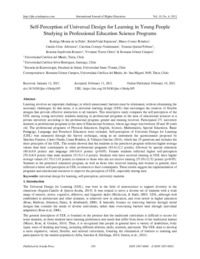Mostrar el registro sencillo de la publicación
Self-perception of universal design for learning in young people studying in professional education science programs
| dc.contributor.author | Monne de la Peña, Rodrigo | |
| dc.contributor.author | Vidal-Espinoza, Rubén | |
| dc.contributor.author | Cossio-Bolaños, Marco Antonio | |
| dc.contributor.author | Urra-Albornoz, Camilo | |
| dc.contributor.author | Cornejo Valderrama, Carolina Genoveva | |
| dc.contributor.author | Quitral-Poblete, Yesenia | |
| dc.contributor.author | Sepúlveda-Romero, Romina | |
| dc.contributor.author | Torres-Olave, Vivianne | |
| dc.contributor.author | Gómez-Campos, Rossana | |
| dc.date.accessioned | 2021-12-14T12:22:03Z | |
| dc.date.available | 2021-12-14T12:22:03Z | |
| dc.date.issued | 2021 | |
| dc.identifier.uri | http://repositorio.ucm.cl/handle/ucm/3571 | |
| dc.description.abstract | Learning involves an important challenge, in which unnecessary barriers must be eliminated, without eliminating the necessary challenges. In that sense, it is universal learning design (UDL) that encourages the creation of flexible designs that provide effective instruction to all learners. This descriptive study compares the self-perception of the UDL among young university students studying in professional programs in the area of educational sciences at a private university according to the professional program, gender and training received. Participated 271 university students in professional programs in the area of Educational Sciences, whose age range was between 20 and 30 years old. The professional programs of Physical Education, English, Science, Mathematics, Special Education, Basic Pedagogy, Language and Preschool Education were included. Self-perception of Universal Design for Learning (UDL) was measured through the Survey technique, using as an instrument the questionnaire proposed by Sánchez-Fuentes, Castro Durán, Casas Bolaños, & Vallejos Garcías (2016), which has 25 questions and includes the three principles of the UDL. The results showed that the students in the preschool program reflected higher average values than their counterparts in other professional programs (83.6±12.2 points), followed by special education (60.4±9.8 points) and language (60.8±6.6 points) (p<0.05). Female students reflected higher self-perception (59.3±8.9 points) than male students (51.8±11.4 points). Students who have received training in UDL have higher average values (61.75±11.63 points) in relation to those who did not receive training (57.65±12.52 points) (p<0.05). Students in the preschool education program, as well as those who received training and women in general, have reflected a better self-perception in UDL in relation to their counterparts. These results suggest the implementation of programs and educational resources to improve the perception of UDL, especially among men. | es_CL |
| dc.language.iso | en | es_CL |
| dc.rights | Atribución-NoComercial-SinDerivadas 3.0 Chile | * |
| dc.rights.uri | http://creativecommons.org/licenses/by-nc-nd/3.0/cl/ | * |
| dc.source | International Journal of Higher Education, 10(4), 105-112 | es_CL |
| dc.subject | Universal design for learning | es_CL |
| dc.subject | Self-perception | es_CL |
| dc.subject | University students | es_CL |
| dc.title | Self-perception of universal design for learning in young people studying in professional education science programs | es_CL |
| dc.type | Article | es_CL |
| dc.ucm.facultad | Facultad de Ciencias de la Educación | es_CL |
| dc.ucm.uri | www.sciedupress.com/journal/index.php/ijhe/article/view/19907 | es_CL |
| dc.ucm.doi | doi.org/10.5430/ijhe.v10n4%25p | es_CL |



